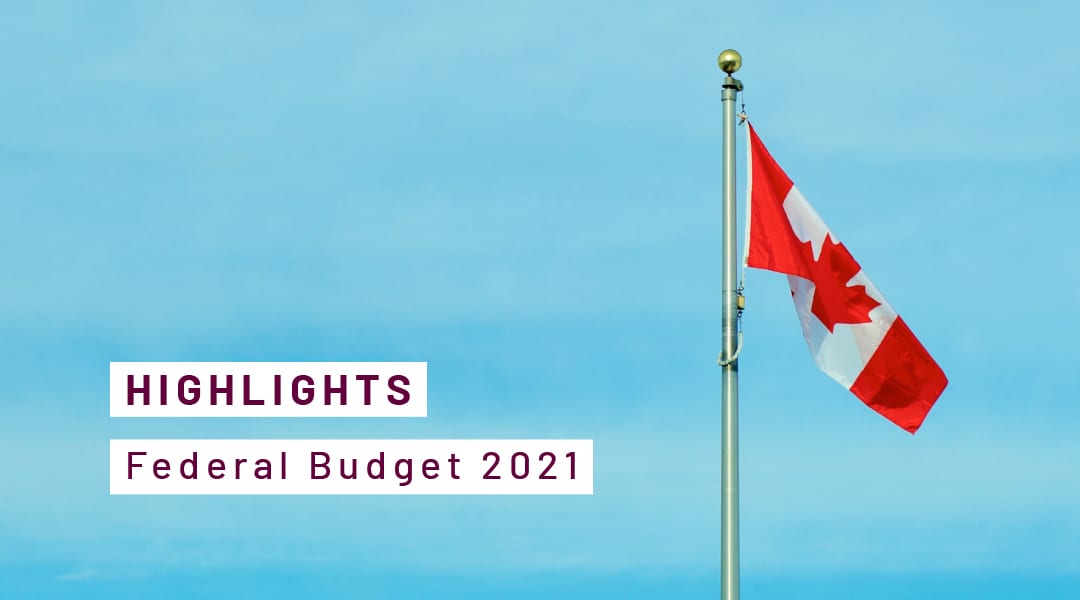Our Tax Specialists have compiled the highlights of the 2021-2022 Canadian Federal Budget. Much rumored changes were an increase in the capital gains inclusion rate and elimination of the capital gains exemption on principal residences. Fortunately, neither of these changes were included in the budget.
As well, the government will now require that income tax payments over $10,000 be remitted electronically effective January 2022. Individuals that electronically file their returns will now be receiving their notices of assessment electronically. The Federal government is proposing to extend the Canada Emergency Wage Subsidy (CEWS) and the Canada Emergency Rent Subsidy (CERS) for an additional 4 periods until September 25, 2021. The maximum subsidy rate for the CEWS and CERS will be on a scaled down basis from 75% for CEWS and 65% for CERS to 20% respectively. The Federal government is also contemplating the possibility of extending both programs for an extra 2 periods to November 20, 2021.
In addition, the budget offers a new subsidy known as the “Canada Recovery Hiring Program” for Canadian Controlled Private Corporations (“CCPCs”) starting on June 6, 2021 for a period of 6 months.
This program provides an alternative to the CEWS and is largely available under the same circumstances. The subsidy will be at a rate of 50% and calculated based on the increase in overall payroll of all employees of the employer. Employers cannot claim both the new Hiring subsidy and the CEWS. Beginning in 2022, a new national 1% tax will be applied on the value of non-resident, non-Canadian owned residential real estate considered to be vacant or underused.
Starting in 2023, all owners of residential property in Canada, other than Canadian citizens or permanent residents of Canada will be required to file an annual declaration for the previous calendar year with the Canada Revenue Agency (CRA), in respect of each Canadian residential property owned.
Definitions for residential property, value, and how the tax would apply will be coming shortly in a CRA backgrounder, which will allow stakeholders an opportunity to comment on this proposed tax.Effective January 1, 2022, the federal government proposes a 10% luxury tax on the sale of new passenger vehicles and personal aircrafts priced over $100,000, and boats priced over $250,000 before GST/HST.
For vehicles and aircrafts priced over $100,000, the amount of the tax will be equal to the lesser of 10% of the full value of the vehicle or the aircraft, or 20% of the value above $100,000. The amount of tax on boats priced over $250,000 will be equal to the lesser of 10% of the full value of the boat or 20% of the value above $250,000. Tax applies at the point of purchase, and is subject to GST/HST.Canadian-Controlled Private Corporations (CCPC) will be allowed to immediately expense certain depreciable properties, other than long lived assets (such as buildings, parking lots, intangibles, etc.), acquired on or after April 19, 2021, and that are available for use before January 1, 2024.
The maximum amount that can be claimed in a taxation year is limited to $1,500,000 and is shared among associated members of a group of CCPCs. Used properties acquired are eligible, provided neither the taxpayer nor a non-arm’s length person previously owned the property, and the property has not been transferred to the taxpayer on a tax-deferred basis (i.e. rollover).The federal budget proposes to introduce a new earnings-stripping rule, limiting the deductibility of net interest expense to no more than a fixed ratio of a corporation’s tax EBITDA, which is taxable income before interest expense, interest income, income tax, and CCA deductions.
The new rule also applies to trusts, partnerships and Canadian branches of non-resident taxpayers but does not apply to CCPCs, together with any associated corporations, that have taxable capital employed in Canada less than $15,000,000, and groups of corporations and trusts whose aggregate net interest expense among Canadian members is $250,000 or less.
The measures will not apply to interest on debt between related Canadian corporations. Non-deductible interest can be carried back 3 years or forward 20 years. Additional rules apply to consolidated groups and exclude interest not otherwise deductible. These measures will apply for taxation years beginning January 1, 2023, and legislation will be introduced in the summer.Individuals with marked disabilities are entitled to claim a credit on their personal tax returns. In 2021, this credit has a value of up to $1,299. Until 2021, the conditions to claim the credit have been limited to individuals with a marked restriction to perform basic activities of daily living. In addition to physical restrictions, the rules defined disability as including issues with memory, problem solving and adaptive functioning.
Effective for 2021 and subsequent taxation years, the criteria will expand to include more issues relating to mental functions necessary for everyday life.
Persons undergoing life sustaining therapy have also been eligible for the disability tax credit mainly based on the weekly time required to undergo these therapies, a minimum of 14 hours per week. The activities qualifying to reach the 14-hour minimum has been greatly expanded. This expanded definition should allow more individuals to meet the minimum hourly requirement and qualify for the disability tax credit.Get all our latest tax and other news in your mailbox.








